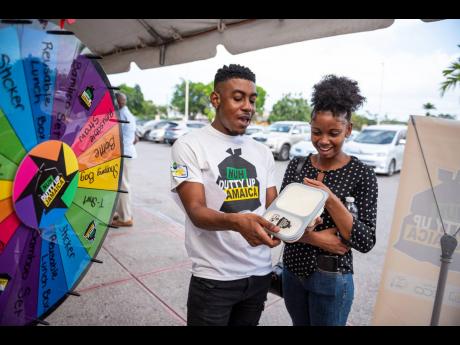Earth Today | ‘Nuh Dutty Up Jamaica’ moves to imprint recycling on Jamaican psyche
THE JAMAICA Environment Trust (JET) is doing its part to ensure the island’s ban on single-use plastics stick, with the encouragement to Jamaicans to change their behaviours.
The entity is, therefore, making its second stop of the ‘Nuh Dutty Up Jamaica’ Road Trip for 2020 at MegaMart at 29 Upper Waterloo Road in Kingston this Saturday (February 22) with the goal to engage patrons with games and activities that highlight ways to reduce single-use plastic.
“The whole Road Trip was started last year as a way for us to highlight the bans on the various types of single-use plastics implemented in Jamaica. It is an opportunity for Jamaicans to educate themselves about the bans and especially to the alternatives to the various single-use plastic items,” said Suzanne Stanley, chief executive officer for JET.
“Often the question is, ‘ok, you have banned plastic bags, sytrofoam, etc, how do we adopt to this change?’ ‘What is available in the market?’ This is a way for us at JET spread the word about that. It is also an opportunity for us to recycle,” she added.
Said Stanley: “We have been focusing a lot on the use of single-use plastics while ‘Nuh Dutty Up Jamaica’ has, over its lifetime, focused on the impacts of garbage on the environment and public health. Over the last two years, and especially since the ban, we have focused on the single-use plastics and not only the items that have been banned, but the single-use bottles, which is the number one item that we pick up each year at International Coastal Clean-Up Day in Jamaica.”
Jamaica, as elsewhere in the Caribbean, has a growing plastic pollution problem, with far-reaching implications for marine life and crucial sectors, such as tourism. In response to this reality, the Government of Jamaica in 2019 instituted the first wave of plastic ban.
Plastic, Styrofoam banned
That ban made it illegal for any person “to manufacture or use any single-use plastic in commercial quantities”, according to the Natural Resources Conservation Authority (Plastic Packaging Materials Prohibition) Order 2018. Also as at January 1, 2019, “no person shall import or distribute any single-use plastic in commercial quantities”, stipulates the Trade (Plastic Packaging Materials Prohibition) Order 2018.
To disobey either order is to risk conviction and a fine not exceeding $50,000 or imprisonment of up to two years in the case of the Natural Resources Conservation Authority Order, and a fine of up to $2 million or up to two years behind bars in the case of the other.
The second ban came this year, with restrictions on styrofoam products.
The bans come at a time when a reported 2.5 billion metric tons of solid waste are produced globally, 275 million metric tons of that plastics. Beyond that, Professor Mona Webber of The University of the West Indies Centre for Marine Sciences revealed last year that some “two billion people within 30 miles of the coast create 100 million metric tons of plastic waste every year; eight million tons of plastic goes into the ocean and by 2050, there will be more plastic in the ocean than fish”.
Meanwhile, Saturday’s ‘Nuh Dutty Up’ Jamaica event, which will run from noon to 3:00 p.m., will afford members of the public who bring in 30 or more plastic bottles for recycling the chance to receive gifts.
“There is a need so we recognise the importance of strategies like recycling to tackle the issue (of plastic pollution). The road trip, in a very small way, helps to facilitate recycling while incentivising action with gifts. The gifts they will get are those alternatives to the things that have been banned. For example, reusable lunch containers to replace styrofoam lunch boxes and reusable straws to replace the plastic straws,” Stanley said.




